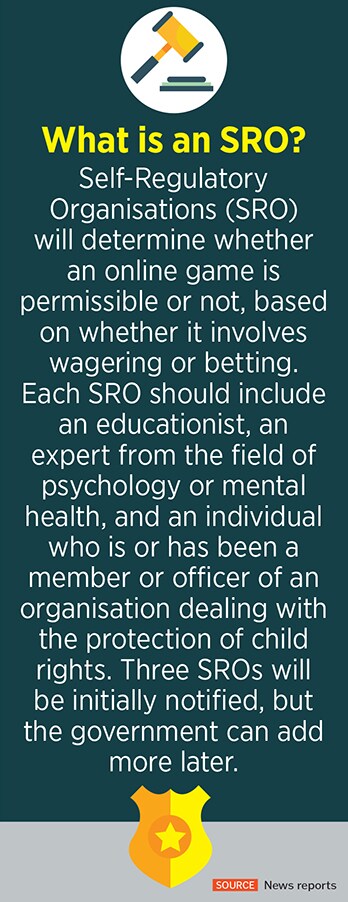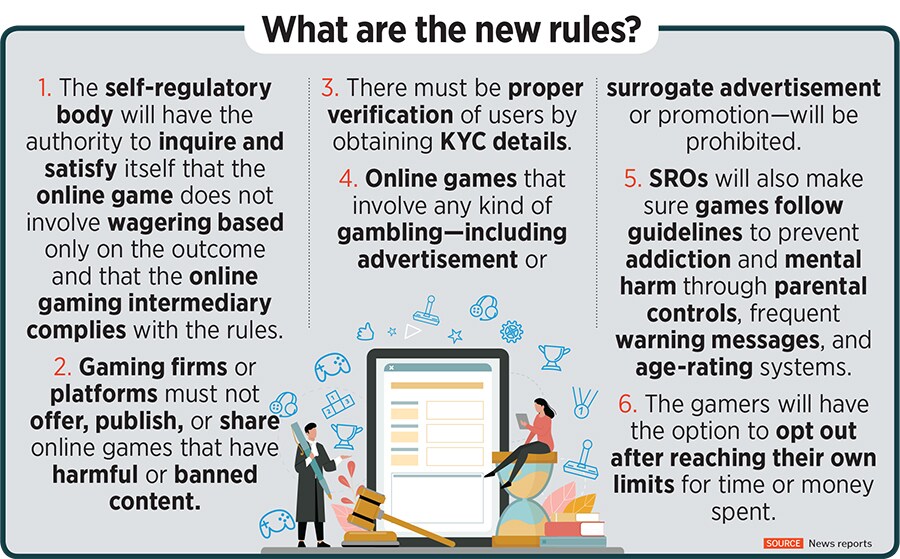
Can the gatekeepers for online gaming help curb betting, gambling?
By Naini Thaker| Apr 13, 2023
Self-regulatory organisations comprising experts from education, mental health and children's rights will be at the heart of distinguishing between games of skill and gambling. How effective will they be?
 [CAPTION](Generic image) Online gaming companies were operating in almost a “free” space. These self-regulatory bodies, act as the middle ground and help provide a lot more clarity to such companies
Image: AFP[/CAPTION]
[CAPTION](Generic image) Online gaming companies were operating in almost a “free” space. These self-regulatory bodies, act as the middle ground and help provide a lot more clarity to such companies
Image: AFP[/CAPTION]
The online gaming industry has seen a fair share of turmoil over the past few years, especially due to the absence of a nodal ministry and a national regulatory framework. The last week, in particular, saw several developments related to the sector that have players with a skin in the game keeping a close watch.
_RSS_The government issued regulations to govern the industry, prohibiting real-money games that are involved with wagering or betting. Minister of State for Electronics and IT Rajeev Chandrasekhar said that “permissible online games are those games, real money or otherwise, that do not involve wagering, user harm in its content and do not create any addictive consequences for children”. The Ministry of Electronics and Information Technology (MeitY) will appoint three self-regulatory organisations (SRO) that will certify permissible online games.
Additionally, MeitY notified the IT Rules to regulate the online gaming sector in India. This means online gaming will be exclusively under the central government’s regulatory purview, and states would only legislate on matters pertaining to betting and gambling—game of chance. Gopal Jain, senior advocate, Supreme Court of India, says, “The rules give a much-awaited legal recognition across the country to the online gaming industry, thus laying the foundation for its accelerated growth and reinforcing India’s tech leadership. Additionally, the rules ensure that there is a clear distinction between online gaming and games which are in the nature of betting, gambling and wagering. Any attempt by the states to regulate online gaming will defeat the intent of these rules, and will not withstand judicial scrutiny and will be against the Constitution.”
Gopal Jain, senior advocate, Supreme Court of India, says, “The rules give a much-awaited legal recognition across the country to the online gaming industry, thus laying the foundation for its accelerated growth and reinforcing India’s tech leadership. Additionally, the rules ensure that there is a clear distinction between online gaming and games which are in the nature of betting, gambling and wagering. Any attempt by the states to regulate online gaming will defeat the intent of these rules, and will not withstand judicial scrutiny and will be against the Constitution.”
However, days after the Centre notified amendments to the IT Rules 2021 to regulate online real-money gaming, Tamil Nadu Governor RN Ravi gave assent to a bill seeking to ban online gambling, including fantasy sports, online rummy and poker with stakes, in the state. “These rules [the notification of gaming rules by the Centre] do not change Tamil Nadu’s stance on online gaming. We don’t see any other way out except banning. Tamil Nadu will follow its own legislation,” said Justice K Chandru, retired Madras High Court judge, who led a four-member committee tasked with giving recommendations on online gaming in the state, according to news reports. It is speculated that there could be a legal battle between the state and Centre ahead.
Also read: Playing by the rules: Can the self-regulation model work for the online gaming industry?
The stakeholders don’t seem to be impressed with the notification. “What this law in effect does is treat and conflates games of skill as gambling and games of chance. The law also completely misunderstands technology and prohibits random number generators, which are an integral part of fairness for online gaming,” says Roland Landers, CEO, All India Gaming Federation. “We will challenge the constitutionality of the law once the effective date is notified… we have full faith that our judicial system will uphold the fundamental rights of the gaming platforms and their users.”
Impact of SROs
Each SRO will include an educationist, an expert in the field of psychology or mental health, and an individual who is or has been a member or officer of an organisation dealing with the protection of child rights. “These central bodies,” says Abhishek Malhotra, managing partner of TMT Law Practice, “will determine if a certain game qualifies as a game of skill or a game of chance, and will also monitor the activities of the game so that there are no grievances that go unaddressed.” Though only three SROs have been approved as of now, more can be added later.
Chandrasekhar, MeitY minister, clarified that real-money gaming is allowed, but it will become impermissible if money is staked on the result of the game. “This means if you make the decision solely based on the outcome of the game, it’s wrong because it is based purely on chance. For instance, if you are betting on the winning of a certain IPL team during a match, then it’s a question purely of chance. But if you're making a fantasy cricket team, based on players' past performances or how the pitch is, then it becomes a game of skill—because you're putting in some skill in determining the final outcome,” says Malhotra.
Once these SROs have been appointed, adds Malhotra: “Online gaming companies will have to submit a list of their respective games, with a self-declaration that these are games of skill. The SRO then can verify and certify them as permissible games under the regulations.” These can be subject to a review within a three-month period. “With this degree of self-regulation, every online gaming company has a threat that if regulations stated by the government and SROs aren’t complied with, they fall under the category of gambling—which is clearly illegal,” says Malhotra. It might be too early to determine the exact impact, but the intent of the government is clear.
So far, online gaming companies were operating in an almost “free” space. These self-regulatory bodies act as the middle ground and help provide a lot more clarity to such companies. “The most critical part of the notified rules, however, is the Code of Conduct or the Prescribed Norms of the SROs. The credentials of the SRO are not akin to a statutory authority, which has a greater amount of responsibility and answerability, and is subjected to certain compliance requirements. The SROs would be essentially acting as gatekeepers to what goes out into the internet, which is a free space,” explains Saumya Singh Rathore, co-founder, WinZO. Gaming players will have to comply with some additional safeguards such as user KYC norms, no inter-player lending on the platform, spending and time limits for users to prevent addiction and many more.
There is clear differentiation between the long-standing debate of game of skill versus game of chance. “The clarity provided by the rules will bolster investor confidence in the sector furthering opportunities for growth and innovation for legitimate domestic gaming platforms. With consumer protection and responsible gaming at the forefront, the regulatory framework will aid in arresting the proliferation of offshore and illegal gambling and betting platforms in India, which operate with little regard for consumer interest,” says Trivikraman Thampy, co-founder and co-CEO, Games24x7.
Also read: Animesh Agarwal (8bit Thug): Gaming has to be immersive and not interruptive
Offshore gambling companies in trouble
On April 11, the Directorate General of GST Intelligence issued notices to 38 such Cyprus-, Mauritius- and Cayman Islands-based entities for allegedly laundering money and siphoning off taxes. Estimates put the tax evasion at Rs12,000 crore from April 2019 to November 2022.
The SROs are also expected to “ensure that no advertisement or surrogate advertisement or promotion of an online game that is not a permissible online game is hosted on its platform”, as per MeitY’s press release. This has been a massive issue particularly with offshore gambling platforms—often posing as fantasy gaming platforms—advertising in India.
“The Centre has taken strong measures to protect Indian consumers from illegal offshore betting and gambling under these provisions further to an ongoing effort by MoIB & consumer affairs. Necessary steps can be taken to determine if an online platform is a gaming platform or a betting platform, and accordingly initiate immediate action against betting platforms, particularly the offshore betting platforms, under section 69(a) of the IT Act,” adds Rathore.
Sector awaits GST clarity
Regulations have been clarified, but what remains is clarity around GST—will it be 18 or 28 percent? It is the biggest survival threat for the sector. The Group of Ministers set up to review GST on online gaming, casinos and horse racing is reportedly likely to keep it at 18 percent on gross gaming revenue. However, 28 percent GST might be recommended for betting, casinos and horse racing—clearly dividing the taxes for games of chance. Most companies in the sector are young and they hope GST for online gaming is retained at 18 percent.